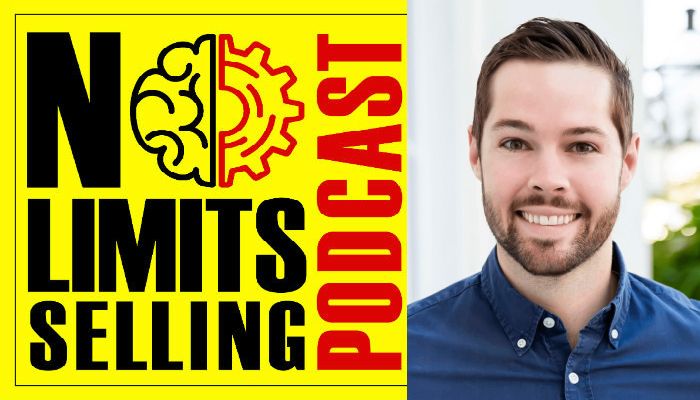Jonathan Spears An Entrepreneur At Heart
On Episode 98 of The No Limits Selling Podcast, we have Jonathan Spears, Founder at Spears Group with Compass. An entrepreneur at heart, Jonathan considers it his greatest achievement to deliver exemplary service and keen expertise as he helps his customers achieve their real estate goals. Motivated by a strong work ethic and a true passion for the real estate business, he has developed an extensive knowledge of the Northwest Florida real estate market.
He puts that knowledge to work for his customers, securing the best deal for his buyers and highest sale price for customers selling their luxury properties. To date, he has closed over $700 million in sales, and for the second consecutive year, Jonathan was named the youngest member of “The Thousand Top Real Estate Professionals,” as published in The Wall Street Journal – inking him in the top one-half of one percent of the more than 1.3 million REALTORS® nationwide by individual sales volume. Jonathan graduated from Florida State University at 19 with a Bachelor’s Degree in Business Administration. He devotes the same uncompromising dedication and work ethic to his customers in every transaction.

Contact Jonathan:
[EDITOR’S NOTE: This podcast is sponsored by No Limits Selling. It is a fun, fast-paced podcast that delivers hard-fought business advice that you can implement today to improve your sales and performance]
Interested In Our Real Estate Coaching Services? Explore Our Website: Link
Feeling Not Well Today? You Can Use Our Mindset Boosters App To amp Up Your Mood: Link
Find us on Social Media:
LinkedIn | Facebook community | Instagram
Like what do you listen to? Subscribe to our podcast!
Ready to become fearless? We can help you become fearless in 60 days so you accomplish more in your career Schedule A 15 min Call with UmarSummary
Introduction and Background of Jonathan Spears
The podcast begins with an introduction of Jonathan Spears, who runs the Spears Group, a real estate firm in Florida. Jonathan started his career in real estate in 2010, right after the financial crash. Despite the challenging market conditions, he decided to get his license on his 18th birthday. He was fast-tracked through school and had a keen interest in finance and business. The financial crisis and the Gulf oil spill had heavily affected Florida, but Jonathan saw this as an opportunity rather than a setback.
Early Career and Challenges
Jonathan's early career was marked by the challenge of establishing himself in a market that was still recovering from the financial crisis. He had to prove his worth and knowledge in the real estate market to overcome the skepticism that came with his young age. He started working for a company called White Sands Realty, where he gained a broad knowledge base about the real estate market. Jonathan was particularly interested in the luxury end of the market and started studying it in detail.
Transition to Sotheby's International Realty
In 2014, Jonathan decided to transition to Sotheby's International Realty. This was a significant step for him as he moved from a reactive role, where he was answering phone calls on someone else's listings, to a proactive role where he had to generate his own business. This transition required him to be proactive and innovative in finding opportunities in the market.
Building a Team
In 2016, Jonathan started building a team to expand his business. He realized that to capture more market share and serve sellers at the highest possible level, he needed additional help. He hired his first independent agent in late 2016, who not only helped him with leads but also brought in new business in an area of the market that he wasn't already in. Jonathan believes that the job of a leader is to have a compelling vision, build a culture where people feel at home, and identify and fill gaps in the team.
Advice for Starting a Team
Jonathan advises those looking to start a team to focus on the value that they can bring to their team members. He believes that the value piece is crucial for retention and culture. He also emphasizes the importance of being slow to hire and quick to fire, although he is proud to have retained almost everyone he has hired over the last five years.
Conclusion
In conclusion, the podcast provides a comprehensive insight into Jonathan Spears' journey in the real estate industry, starting from his early career initiation during a challenging economic period to his current success as a leader in the field. Despite starting in a market recovering from the financial crisis, Jonathan's determination and strategic approach allowed him to establish himself and overcome skepticism related to his young age. His transition to Sotheby's International Realty marked a significant shift in his career, moving from a reactive to a proactive role. Recognizing the need for expansion, he built a team, focusing on providing value to his team members and fostering a positive culture. His story serves as an inspiring example for those aiming to make a significant impact in the real estate industry, demonstrating the importance of resilience, strategic thinking, and effective team building.
Questions & Answers
Who is Jonathan Spears in the real estate industry?
How did Jonathan Spears start his career in real estate?
What was Jonathan Spears' strategy during the financial crisis?
What was the significant transition in Jonathan Spears' career?
How did Jonathan Spears build his team?
What are Jonathan Spears' key advice for aspiring real estate agents?
What can we learn from Jonathan Spears' journey in real estate?
Don’t miss this opportunity to transform your real estate career with one-on-one coaching. As an experienced real estate coach, I, Umar Hameed, am dedicated to helping you unlock your full potential and achieve your real estate goals. To learn more about who am I and my clients ↓
If you’re ready to take the next step, book an appointment with me today and begin your journey toward success in the real estate industry.
